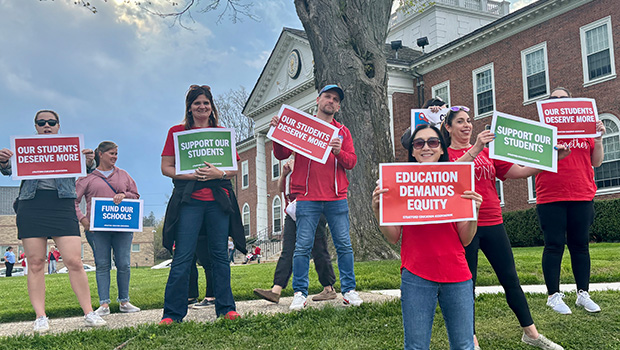As cities and towns face the loss of federal COVID funding, rising education costs, and other fiscal challenges, CEA is working with local teachers’ unions to ensure budget shortfalls don’t land on the shoulders of Connecticut’s children and teachers.
Districts including Enfield, Shelton, Stamford, Stratford, Windsor Locks, and others are bracing for potential cuts that run into the millions. Teachers in at least a dozen other towns have been told to expect losses of more than five of their colleagues—in some cases 40, 50, or 100. These include Darien and other wealthy suburbs, high-needs cities such as Danbury, and everywhere in between.
“We already don’t have enough staff, and teachers are buying their own supplies,” says Enfield Teachers’ Association President Emily Hulevitch, adding, “These are our children, and this is our future. Our students deserve better.”
With help from CEA UniServ, communications, and government relations staff, Hulevitch and ETA Vice President Bill Delaney have been organizing members–many of whom not only teach in Enfield but also live there—to reach out to their town council and ask them to support the board of education’s proposed budget.
“The board’s budget allows Enfield teachers to continue providing the educational services our students need,” says Delaney. “There is a real fear, however, that the budget will be slashed. This week, 121 teachers received letters letting them know they will not be renewed. Think of the impact that has not only on those educators and their families but also their colleagues and students.”
Enfield is far from alone in its fight to protect school funding.
In Shelton, a years-long pattern of passing barebones budgets has resulted in a multimillion-dollar shortfall, and teachers are being asked–not for the first time–to bear the burden.
“In the past, our teachers have taken furlough days in order to plug the budget gap, but that has not led to systemic change or long-term solutions,” says Shelton Education Association President Joann Allen. “In fact, we are right back to square one this year with a deficit, and teachers and staff being asked to sacrifice their pay once again–or face layoffs. This cycle needs to stop, and SEA is willing to work with the superintendent, board of education, and city together to solve this situation once and for all.”
In Shelton’s case, the layoffs are effective immediately–in May–which is highly unusual.
“I have had teachers crying, and I am crying with them,” Allen shares. “They’ve poured their heart into their work, their students, their classrooms, and even knowing that they’re leaving, many have offered to leave behind supplies and bulletin boards they’ve paid for out of pocket just so that their students don’t have to lose even more than they’re losing already. It’s heartbreaking.”
Stratford has faced a similar battle in recent months, as elected officials have threatened to upend the superintendent’s budget—a budget that would simply allow schools to maintain their current level of programming. Cuts translate to a loss of multiple certified positions, ranging from reading and math interventionists to school librarians. Nearly 200 educators turned out in a show of #RedforEd at the town council’s ordinance committee meeting this week, and 30 offered public comments asking for the superintendent’s budget to be supported and passed. A vote is anticipated in the coming weeks.
“A town’s budget reflects its priorities,” says CEA President Kate Dias. “Teachers are asking voters and elected officials to ensure students and their education are prioritized.”
The key to preventing budget cuts that negatively impact schools is to stay informed and active in local and state politics long before decisions reach the table, says CEA political engagement coordinator Gus Melita.
“That means talking to your superintendent in the fall, when budgets are starting to take shape,” he says. “It means campaigning to elect town and state officials who value public schools. Take the pulse of your town by participating in board of education, finance, and town leadership meetings and following local discussions. Work closely with parent organizations and other groups that are also invested in students’ success.”
Many people have false or outdated assumptions about the level and types of resources schools need, and hearing a teacher’s perspective can be helpful and eye-opening, Melita adds.
“Those conversations,” he says, “need to happen long before budgets are up for a vote.”
On the statewide front, CEA is working to ensure that municipalities are not saddled with massive costs, often related to special education services, that they could not plan or budget for.
“Excess cost grants and similar funding assistance from the state would go a long way toward alleviating those issues, and that’s something we’ve been talking about with state legislators and the governor,” Dias says.







